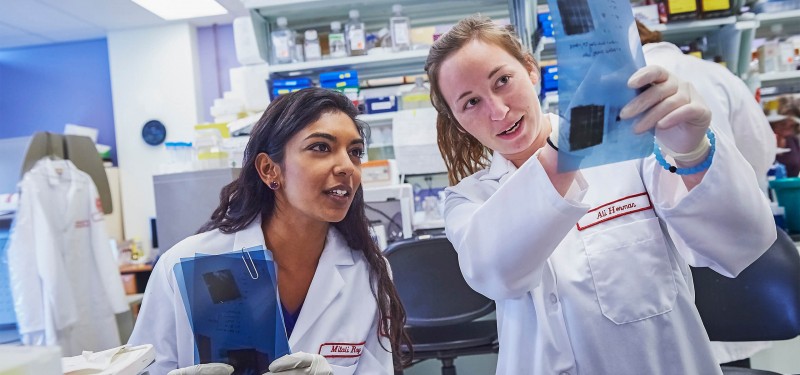The Neuroscience cluster is an educational working group, supporting PhD, MD/PhD, and MS educational/research programs within Lewis Katz School of Medicine at Temple University’s Biomedical Sciences Graduate Program. This cluster provides thematic courses, research opportunities, and educational activities related to neuroscience, bringing together faculty members from basic science and clinical departments, as well as research centers—Center of Substance Abuse, Center for Neurovirology and Gene Editing, and Comprehensive NeuroAIDS Center, and Shriner’s Hospitals Pediatric Research Center.
Neuroscience is an extremely broad field encompassing the mechanisms involved in central and peripheral nervous system development, neuronal function, injury, and repair. These mechanisms contribute to memory, emotion, sensory (including pain), motor, and cognitive functions. The Neuroscience cluster offers exposure to a number of areas of basic neuroscience research and education with the goal of translating basic research advances into treatments for neurological and neuropsychiatric disorders. Indeed, the breadth and depth of the faculty members encourages an interdisciplinary approach to neuroscience education that will prepare our graduate students with an understanding of neurodegenerative disease processes, neural injury, and promote the development of effective therapeutics and modalities for repair.
The Neuroscience cluster curriculum includes a weekly student seminar, research-focused journal clubs, and a series of cluster-based electives that provide a strong foundation in basic neuroscience, neuropharmacology, and translational neuroscience research. The goal of this curriculum, integrated with the Biomedical Sciences Graduate Program, is to prepare a new cadre of scientists and physicians with interdisciplinary neuroscience training and support trainees' contributions to the development of effective treatments for neurological disorders.
Faculty
- Mary Barbe, PhD
- Silvia Fossati, PhD
- Gianluca Gallo, PhD
- Kathleen M. Giangiacomo, PhD
- Wen-Zhe Ho, MD, MPH
- Rafal Kaminski, PhD
- Shin Kang, PhD
- Kamel Khalili, PhD
- Seonhee Kim, PhD
- Lynn Kirby, PhD
- Barbara Krynska, PhD
- Shuxin Li, PhD
- Victor Luna, PhD
- Lee-Yuan Liu-Chen, PhD
- Henry Parkman, MD
- Terry Heiman-Patterson, MD
- Yuri Persidsky, MD, PhD
- Domenico Praticò, MD
- Scott Rawls, PhD
- Anjali M. Rajadhyaksha, PhD
- Slava Rom, PhD
- Brad Rothberg, PhD
- Mahmut Safak, PhD
- Ilker Sariyer, PhD
- Bassel E. Sawaya, PhD
- Rosario Scalia, MD, PhD
- Stephanie Sillivan, PhD
- George Smith, PhD
- Young-Jin Son, PhD
- Gareth Thomas, PhD
- Ellen Unterwald, PhD
- Sara Ward, PhD
- Zeng-jie Yang, MD, PhD*
- Huaqing Zhao, PhD
*Indicates Fox Chase Cancer Center faculty

